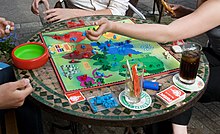
Back Risk Afrikaans ريسك (لعبة) Arabic Risk Catalan Risk Danish Risiko (Spiel) German Ρισκ (παιχνίδι) Greek Risk Spanish Risk Basque ریسک (بازی) Persian Risk (peli) Finnish
 | |
 A game of Risk being played | |
| Publishers | Hasbro Winning Moves Games USA |
|---|---|
| Years active | 1957–present |
| Genres | Strategy game Board game War game |
| Players | 2–6 |
| Setup time | 5–15 minutes |
| Playing time | 1–8 hours |
| Chance | Medium (5–6 dice, cards) |
| Age range | 10+ |
| Skills | Strategy, tactics, negotiation |
Risk is a strategy board game of diplomacy, conflict and conquest[1] for two to six players. The standard version is played on a board depicting a political map of the world, divided into 42 territories, which are grouped into six continents. Turns rotate among players who control armies of playing pieces with which they attempt to capture territories from other players, with results determined by dice rolls. Players may form and dissolve alliances during the course of the game. The goal of the game is to occupy every territory on the board and, in doing so, eliminate the other players.[2] The game can be lengthy, requiring several hours to multiple days to finish. European versions are structured so that each player has a limited "secret mission" objective that shortens the game.
Risk was invented in 1957 by Albert Lamorisse, a French filmmaker, and it became one of the most popular board games in history, inspiring other popular games such as Axis & Allies and Settlers of Catan. The simple rules but complex interactions make it appealing to people of all ages. It is still in production by Hasbro with numerous editions and variants with popular media themes and different rules, including PC software versions, video games, and mobile apps.[3]
- ^ Gordon, David (4 October 2013). "Risk vs Diplomacy". TotalDiplomacy. Archived from the original on 2 February 2017. Retrieved 27 January 2017.
- ^ "Risk! Rules of Play" (PDF). Parker Brothers. 1963. Archived (PDF) from the original on 9 October 2022. Retrieved 24 May 2015.
- ^ Callen, Moshe. "The Risk series of games: how and why each game is different". BoardGameGeek. Archived from the original on 4 June 2024. Retrieved 4 June 2024.